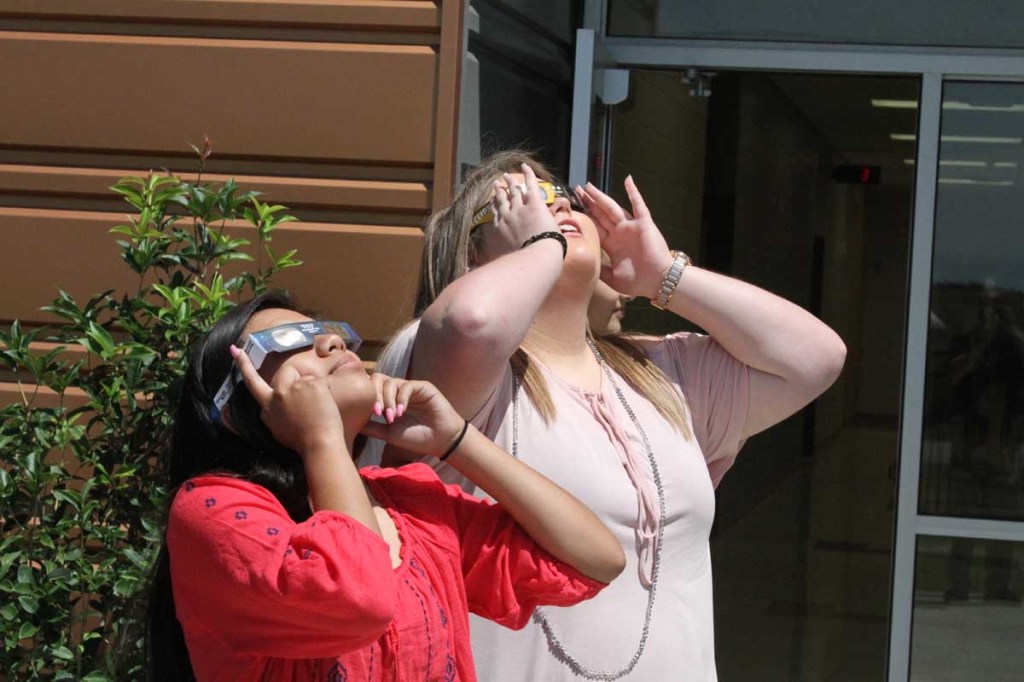Light goes out in Georgia: North Georgia clouds part for eclipse in totality
Published 9:53 pm Monday, August 21, 2017

- Andrea Rodriguez, left, and Haley Baker watch the moon move across the face of the sun Monday afternoon outside Colquitt County High School as Jennifer Guerrero, background, waits her turn to look. The high school did not have officially sanctioned viewing events because it didn’t have safety glasses for the students, Principal Stephanie Terrell said, but several teachers had a small number of the glasses that they loaned to students so they could take turns watching the eclipse. Sunlight dimmed during the partial eclipse here, but Moultrie is about 300 miles south of Rabun Gap, the only place in Georgia that saw a total eclipse Monday.
RABUN GAP, Ga. – As the moon’s shadow crept across the United States, 14-year-old Gabe Nutter stood with his telescope – equipped with a solar filter – and waited for Georgia’s moment in the darkness.
“I’m really excited,” the Buford teen said as his three best friends and mom hung out at their campsite on the athletic field at the Rabun Gap-Nacoochee School in northeast Georgia.
Trending
The centerline, which offers the longest period of darkness, zipped through just 12.5 miles of northeast Georgia as the moon’s shadow crossed over the country.
The promise of fully experiencing a likely once-in-a-lifetime celestial show attracted people from all over, including Alex Jernigan, who traveled from Donalsonville in southwest Georgia.
“It looks like something out of Star Wars,” Jernigan said as the partial eclipse started Monday afternoon.
And then the clouds rolled in.
“There it goes,” said Jan Hyatt, her head tilted toward the sky as she watched the clouds overtake the sun. “Bye, bye.”
It was a disappointment for Hyatt, who had traveled from Columbus with family to see the total eclipse. She’d heard her 90-year-old mother recall vividly how frightened she was when she witnessed a total eclipse as a 12-year-old girl.
Trending
“I wanted to see the corona. That was a big thing to me,” Hyatt said.
At least she could watch the replay of the eclipse later on TV, she said. Plus, at a minimum, there would be the bizarre experience of mid-afternoon nighttime on what was otherwise a blistering hot summer day.
Helen Hurst sat next to Hyatt, cheering the clouds to move along with just 15 minutes till the total eclipse. “It’s peeking through,” Hurst said hopefully.
They were in luck. The clouds opened up just before the moon lined up with the sun, giving the sold-out crowd at this official NASA viewing location what they came to northeast Georgia to see and creating one of the more dramatic eclipses.
“Oh my god, I’m shaking. I can’t hold still,” Nutter said excitedly as he tried to snap photos through his telescope during the precious 2 minutes and 38 seconds he had with the eclipse.
For that brief window of time, the sun was a mere ring in the sky. The temperature was noticeably lower, and 3 p.m. suddenly felt like nightfall.
“It looked like there was a black hole in the sky,” Nutter said afterwards. “It was the coolest thing ever.”
The sun then started to reemerge, presenting a glint known as the “diamond ring” effect. Before long, it was no longer safe to view the sun with the naked eye, and then the clouds were back, denying north Georgia the partial eclipse on the backend.
That was just fine with Charlie McHenry, one of Nutter’s friends.
“The fact that there were clouds and they went away makes it even more memorable and iconic,” he said. “Basically, we won the eclipse.”





